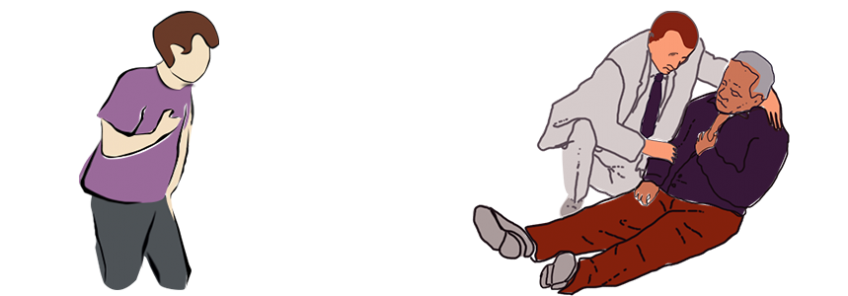Chest Pain or Tightness

Chest pain is the pain that may be felt anywhere from the level of shoulder to the bottom of ribs. Chest pain or tightness is sometimes a serious symptom, resulting from heart attack. But having chest pain does not necessarily mean you are having a heart attack. Most people who go to the emergency room with chest pain may have less serious problems, such as muscle pain, heartburn or anxiety, but we never know for sure.
Why does it matter?
It is very important that you take chest pain or tightness seriously. This is particularly more important if you are an adult who had heart attack in the past or is at risk of such attack. Heart attack causes severe chest pain because of ischemic injury to the heart muscles when blood supply is interrupted due to blockade of arteries of the heart. This is life threatening as this may lead to failure of the heart. Other simpler causes of chest pain may be the result of inflammation or injury in the chest or acidity or even psychological and needs to be differentiated properly with specific tests.
Causes
Heart attack (Myocardial Infarction) or Angina:
Heart attack is the most important and life-threatening cause of chest pain resulting from sudden blockade of coronary arteries that supply blood to the heart. Angina is the chest pain that results from narrowing of the coronary arteries, usually from deposition of plaques called atheroma in the walls of arteries. There are many risk factors for these problems, collectively known as coronary artery disease, most of which can be modified, while some cannot be. Modifiable risk factors include:
- Smoking
- Diabetes mellitus
- Hypertension
- Obesity
- Unhealthy dietary habit, mainly fatty diet
- Inactive and stressful life style
Costrocondritis: It is a common and severe but harmless cause of chest pain resulting from inflammation of joints between the cartilages and bones at the ribcage.
Gastro-oesophageal Reflux Disease: It is a common condition related to the reflux of acidic gastric content that causes what is popularly called ‘heartbun’, a burning pain that begins over the stomach around the central part of lower chest and frequently confuses with heart attack.
Anxiety: It presents with fearful feeling, worry and tensed state of mind which commonly accompanies bodily symptoms such as chest pain.
Pleurisy: It is a condition resulting from inflammation of pleura that lines the lungs when there is pneumonia, lung collapse, blood clot in the lungs etc. Commonly there is pain in the part of chest overlying area of the lungs that is affected by infection, for example, during deep breathing or coughing.
Other causes: There may be many other causes of chest pain, some of them are:
- Problems in the heart other than heart attack, like infection around the heart
- Problems affecting the lungs, like pneumonia or pneumothorax (air outside the lungs lining, pulmonary embolism (blood clot in vessels of the lungs)
- Problems in the digestive tract like gastritis, peptic ulcers, or irritable bowel syndrome
- Shingles (herpes zoster), a condition that occurs after chickenpox infection resulting in a painful rash
- Any of injury to the chest, that includes surgery
When to seek help?
Any chest pain that is new, severe or persisting may mean serious disease like heart attack and you should seek medical help immediately. The following symptoms will help you to consider heart attack, especially if they last more than a few minutes or keep happening repeatedly.
- Sudden onset pain, tightness or discomfort in the center of the chest
- Pain, or discomfort in the arms, neck, jaw or back
- Chest pain gets worse when you walk, climb stairs, or do any physical activity
- Shortness of breath and gasping for breath
- Having cold, clammy skin or excessive sweating
- An uneven or racing heart rate
- Feeling lightheaded, dizzy or even fainting
- Nausea, vomiting or heartburn
- Anything that worries you, especially if you have had heart attack previously or you have diabetes, high blood pressure, high cholesterol etc.
Treatment Options:
People often delay seeking medical help for a heart attack when they think that chest pain or tightness is not serious or vanish away on its own. Doing this may put you at risk of serious permanent damage to your heart and even cause death.
If you experience chest pain and especially if you have risk factors for heart attack, take a rest from whatever you are doing and visit the hospital as soon as possible. In the emergency room, you will get certain tests including ECG, Chest X ray and blood tests, to find out if you actually have problem with the heart. You will get Oxygen and medicine to reduce your pain and protect your heart further.
However, other causes of chest pain may not be so serious. In case of heart burn, medicine to neutralize and decrease secretion of acid will be given by your doctor and you should take timely meal, with a lot of water and no alcohol. Pain killer and cold compression will relieve the pain in muscle or ribs.



Send us your feedback on this article